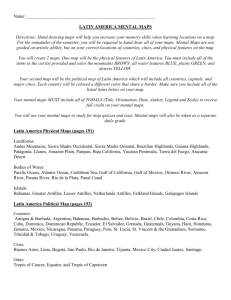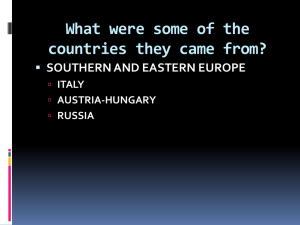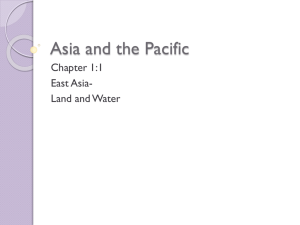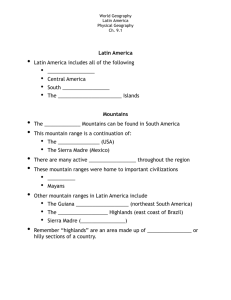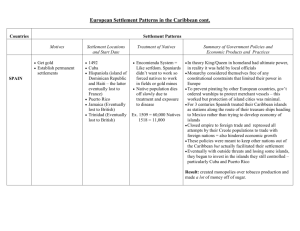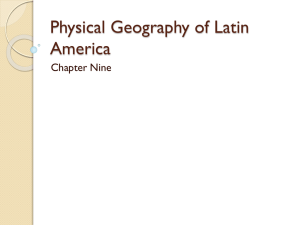Latin America Physical Geography
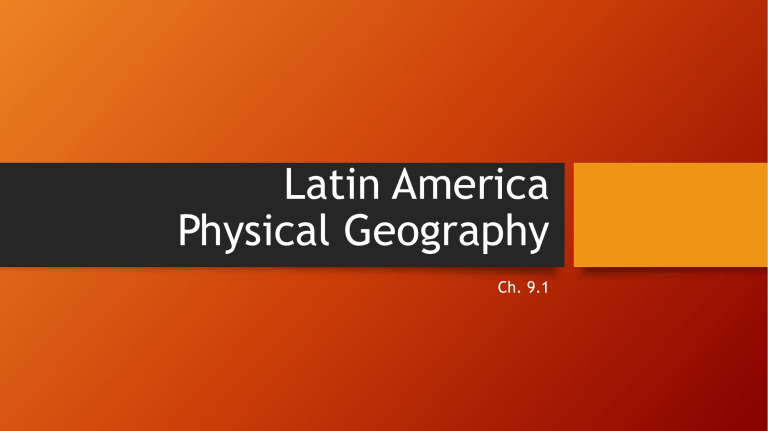
Latin America
Physical Geography
Ch. 9.1
Latin America
• Latin America includes all of the following
• Mexico
• Central America
• South America
• The Caribbean Islands
Mountains
• The Andes Mountains can be found in South America
• This mountain range is a continuation of:
• The Rockies (USA)
• The Sierra Madre (Mexico)
• There are many active volcanoes throughout the region
• These mountain ranges were home to important civilizations
• Inca
• Mayans
Andes Mountains
Mountains
• Other mountain ranges in Latin America include
• The Guiana Highlands (northeast South America)
• The Brazilian Highlands (east coast of Brazil)
• Sierra Madre (Mexico)
• Remember “highlands” are an area made up of mountains or hilly sections of a country.
The Plains
• South America has wide plains that offer rich soil for growing crops and grasses for grazing livestock.
• Llanos
• Found in Columbia and Venezuela
• Vast plains that are grassy and treeless
• Similar to the Great Plains in the USA
• Cerrado
• Plains of the Amazon River Basin
• Savannas with flat terrain and moderate rainfall
• Suitable for farming
• Mostly undeveloped, but Brazilian government is encouraging movement here
The Plains
• Pampas
• Found in Argentina and Uruguay
• Plains with areas of rich soil
• Main products are cattle and wheat grain
• The gaucho culture has grown up in this region
• The “gaucho” is similar to the American cowboy
Rivers in Central America and Mexico
• The Rio Grande
• Forms the border between the United States and Mexico
• This is the largest river in Mexico and all of Central America
• Central America is less dependent on river systems than North America because of their proximity to the oceans.
Rivers in South America
• Orinoco River
• Northern part of South America, mainly in Venezuela
• 1500 miles long
• Drains the interior lands of Venezuela and Columbia
• Amazon River
• 4000 miles from west to east
• Flows from the Andes eastward across the central lowlands to the Atlantic
• 1000 tributaries (small river or stream) feed into the Amazon
• The Amazon carries more water into the ocean than any other river in the world
Rivers in South America
• Paraná River
• Originates in the highlands of Brazil
• 3000 miles south and west through Paraguay and Argentina
• Turns into an estuary (large body of water open to sea) between Argentina and Uruguay
• This estuary is called the Rio del la Plata
Major Islands of the Caribbean
• The Caribbean Islands consist of three major groups
• The Bahamas
• The Greater Antilles
• The Lesser Antilles
• All together these islands are sometimes called the West Indies
• These islands were discovered by Christopher Columbus in 1492
Major Islands of the Caribbean
• The Bahamas
• The Bahamas are made up of hundreds of islands of the southern tip of
Florida and north Cuba
• Nassau is the capital and largest city in the Bahamas
Major Islands of the Caribbean
• Greater Antilles
• Made up of the larger islands in the Caribbean
• Includes Cuba, Jamaica, Puerto Rico, and Hispaniola
• The Island of Hispaniola is divided into the Dominican Republic and Haiti
• Lesser Antilles
• Small islands southwest of Puerto Rico
• Divided into the Windward and Leeward islands
• Wind blows toward the Windward and away from Leeward
